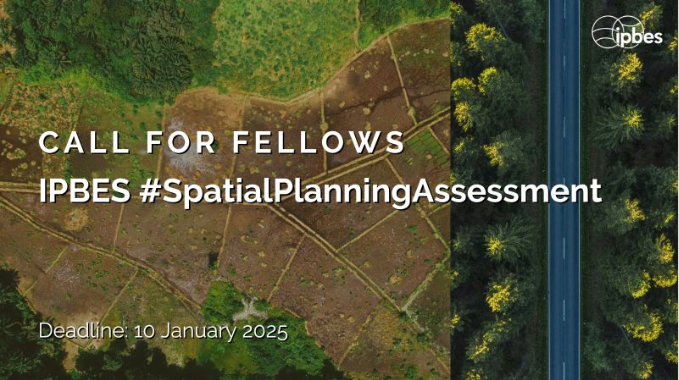
Deadline: 10 January 2025
The Intergovernmental Science-Policy Platform on Biodiversity and Ecosystem Services (IPBES) launched a call for fellows for the methodological assessment of integrated biodiversity-inclusive spatial planning and ecological connectivity (“spatial planning assessment”). The IPBES fellowship programme provides an opportunity for outstanding early-career individuals, including PhD students, from all backgrounds and disciplines working on biodiversity and ecosystem services to participate in IPBES assessments.
The IPBES fellowship programme offers early-career researchers a unique opportunity to join a diverse, multidisciplinary group of outstanding individuals. The programme provides numerous benefits to participants, including exposure to international scientific processes, networking opportunities with leading experts, and the chance to contribute to influential global assessments. Fellows will gain valuable experience in translating complex scientific findings into policy-relevant information, thereby developing skills crucial for bridging the gap between research and decision-making in biodiversity conservation and ecosystem management.
Fellows selected to take part in the Intergovernmental Science-Policy Platform on Biodiversity and Ecosystem Services (IPBES) fellowship programme will participate in the production of one of the chapters of IPBES assessment, taking part in author and chapter meetings together with the rest of the experts undertaking the assessment. Also, fellows will receive training to gain in-depth understanding of the IPBES assessment process and will be paired up with a mentor for the assessment period. There are no limits on the content of the collaboration between mentors and fellows and there are a number of examples of fellows and mentors working together on joint projects, publications and funding applications beyond the scope of their collaboration under the IPBES assessment. Fellows are expected to participate in the author meetings and training workshops.
Candidates should:
1. Be in the early stages of their careers, indicatively not older than 35 years of age and preferably not more than 5-7 years after having completed their academic degree. They should have expertise in one or more disciplines within natural science, social science or humanities, represent or have expertise in indigenous and local knowledge systems, and/or be policy experts and practitioners;
2. Be able to make a time commitment of 15 percent of their time over the assessment period, including attending author meetings and training;
3. Be willing to actively share their experience gained from the assessment process, e.g., within their home institutions;
4. Have excellent speaking, reading and writing skills in English;
5. Have good research and analytical skills in dealing with complex issues, demonstrated ability to deal with material from multiple disciplines and write concisely, accurately reflecting the information in the literature, as well as the ability to meet deadlines;
6. Have demonstrated ability to interact with people from other disciplines and work effectively and efficiently in a multicultural team;
7. Have access to a reliable internet connection in their home institution to allow free access to email and worldwide web resources;
8. Be an active ambassador of IPBES, in particular the IPBES fellowship programme.
Candidates will be selected based on their merit and academic qualifications and in their individual capacity as experts, with the view to achieve disciplinary, gender and geographic balance.
The fellowship programme is an unpaid scheme in which selected fellows are expected to work pro bono, as all other IPBES experts. Expenses for attending selected meetings will be covered for fellows from developing countries and countries with economies in transition in accordance with UN rules. Fellows from developed countries (e.g., Portugal) are expected to cover their own expenses and are encouraged to seek support from their home institutions.
IPBES is organizing an online meeting (5 November) on this nomination of fellows as well as experts (see here for details) for the IPBES spatial planning assessment.
You can find additional information here.